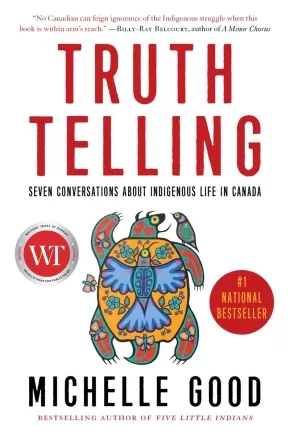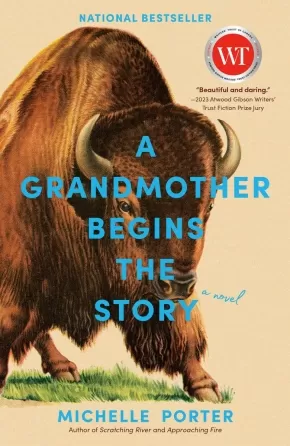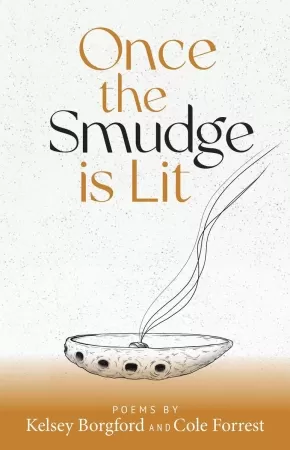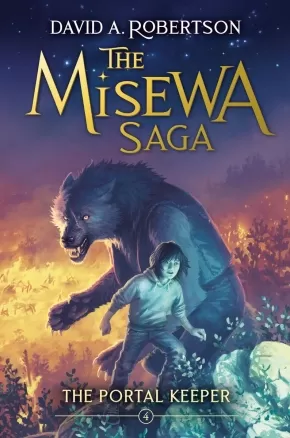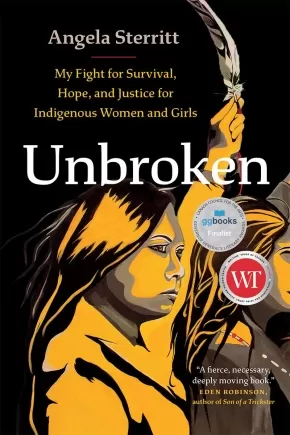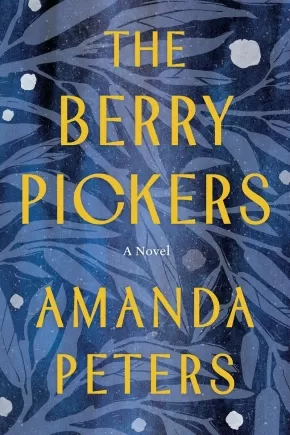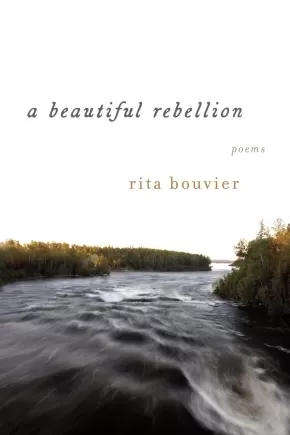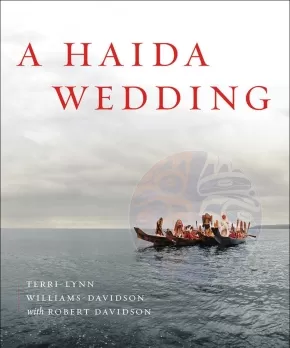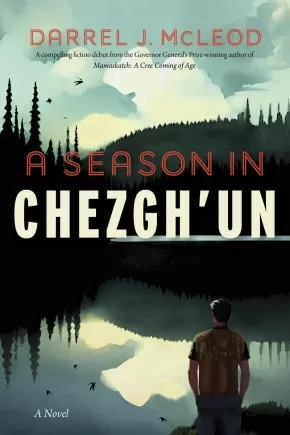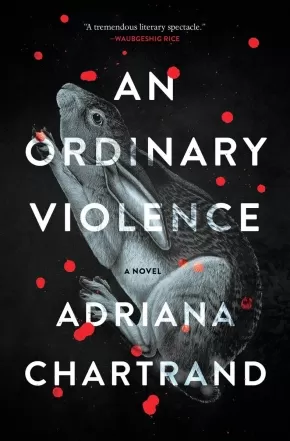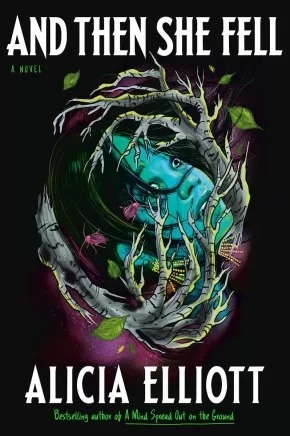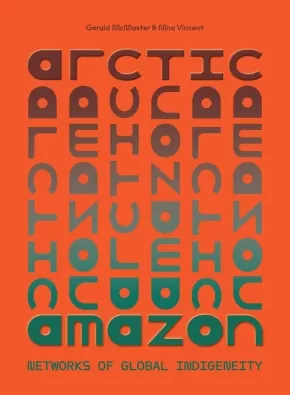
2024 - 2025 Selections
1
-
15
of
50 Results;
Sort By
Go To
of 4
FLASH SALE! Truth Telling: Seven Conversations about Indigenous Life in Canada (PB)
$15.75 $21.00
Format:
Paperback
Text Content Territories:
Indigenous Canadian;
Reading Level: N/A
ISBN / Barcode: 9781443467841
Synopsis:
Synopsis:
A bold, provocative collection of essays exploring the historical and contemporary Indigenous experience in Canada.
With authority and insight, Truth Telling examines a wide range of Indigenous issues framed by Michelle Good’s personal experience and knowledge.
From racism, broken treaties, and cultural pillaging, to the value of Indigenous lives and the importance of Indigenous literature, this collection reveals facts about Indigenous life in Canada that are both devastating and enlightening. Truth Telling also demonstrates the myths underlying Canadian history and the human cost of colonialism, showing how it continues to underpin modern social institutions in Canada.
Passionate and uncompromising, Michelle Good affirms that meaningful and substantive reconciliation hinges on recognition of Indigenous self-determination, the return of lands, and a just redistribution of the wealth that has been taken from those lands without regard for Indigenous peoples.
Truth Telling is essential reading for those looking to acknowledge the past and understand the way forward.
Reviews
“With blistering clarity, Michelle Good exposes the contradictions at the heart of Canada, but also imagines beyond them, setting out a specific vision for an Indigenous future governed by us. Good’s essays, woven with personal testimony, are deeply researched and traverse great swaths of history and policy; they are also very rousing and moving. No Canadian can feign ignorance of the Indigenous struggle when this book is within arm’s reach.” — Billy-Ray Belcourt, author of A Minor Chorus
"Good reminds us what the truth in Truth and Reconciliation actually requires of all of us: Indigenous peoples and Canadians. Addressing storytelling and historical myth-making, this book would have changed my nineteen-year-old world had it been available and rendered normative for my teachers. Good’s work is formidable, elemental and reminiscent of Cardinal’s Unjust Society. This work, should be required reading for every Canadian. Smart, generous and insightful. 'There is no such thing as Crown Land. It is all Indigenous land.' Good writes. This truth resonates. Serves notice: it is time." — Dr. Tracey Lindberg, Law Professor, author of Birdie
“Truth Telling is at once heartfelt, instructive, and authentic, expertly exploring the key issues that have shaped the Indigenous reality in Canada.… This collection is an indispensable resource.” — Waubgeshig Rice, author of Moon of the Crusted Snow
“As Canadians search for a national approach to reconciliation... this book reminds us of how we arrived at this moment.…[and] is the kind of reference that will help us navigate our fraught journey.” — Dr. Eldon Yellowhorn, Professor of Indigenous Studies, Simon Fraser University
“Truth Telling is a powerful, urgent, and necessary book that gets to the heart of true reconciliation and maps a course for achieving it. Bridging personal stories and lived experiences with sharp historical analysis, Michelle Good’s writing is both beautiful and heartbreaking. Honest, forthright, and powerful, Truth Telling offers insights and analysis that every policymaker and politician—indeed, any person who calls Canada “home”— can and must read. Urgently.” — 2023 Balsillie Prize for Public Policy Jury
Educator Information
Truth Telling is a collection of essays about the contemporary Indigenous experience in Canada.
Additional Information
232 pages | 5.00" x 7.50" | Paperback
A Grandmother Begins the Story: A Novel (PB)
$22.95
Format:
Paperback
Text Content Territories:
Indigenous Canadian; Métis;
Reading Level: N/A
ISBN / Barcode: 9780735245396
Synopsis:
Synopsis:
Five generations of Métis women argue, dance, struggle, laugh, love, and tell the stories that will sing their family, and perhaps the land itself, into healing in this brilliantly original debut novel.
Carter is a young mother, recently separated. She is curious, angry, and on a quest to find out what the heritage she only learned of in her teens truly means.
Allie is trying to make up for the lost years with her first born, and to protect Carter from the hurt she herself suffered from her own mother.
Lucie wants the granddaughter she's never met to help her join her ancestors in the Afterlife.
Geneviève is determined to conquer her demons before the fire inside burns her up, with the help of the sister she lost but has never been without.
And Mamé, in the Afterlife, knows that all their stories began with her; she must find a way to loose herself from the last threads that keep her tethered to the living, just as they must find their own paths forward.
This extraordinary novel, told by a chorus of vividly realized, funny, wise, confused, struggling characters—including descendants of the bison that once freely roamed the land—heralds the arrival of a stunning new voice in literary fiction.
Additional Information
336 pages | 5.18" x 8.00" | Paperback
Becoming a Matriarch (PB)
$23.00
Format:
Paperback
Text Content Territories:
Indigenous Canadian; First Nations; Dene; Dane-zaa (Dunne-za);
Reading Level: N/A
ISBN / Barcode: 9780385697798
Synopsis:
Synopsis:
When matriarchs begin to disappear, there is a choice to either step into the places they left behind, or to craft a new space.
Helen Knott’s bestselling debut memoir, In My Own Moccasins, wowed reviewers, award juries, and readers alike with its profoundly honest and moving account of addiction, intergenerational trauma, resilience, and survival. Now, with her highly anticipated second book, Knott exceeds the highest of expectations with a chronicle of grief, love, and legacy. Having lost both her mom and grandmother in just over six months, forced to navigate the fine lines between matriarchy, martyrdom, and codependency, Knott realizes she must let go, not just of them, but of who she thought she was.
Woven into the pages are themes of mourning, sobriety through loss, and generational dreaming. Becoming a Matriarch is charted with poetic insights, sass, humour, and heart, taking the reader over the rivers and mountains of Dane Zaa territory in Northeastern British Columbia, along the cobbled streets of Antigua, Guatemala, and straight to the heart of what matriarchy truly means. This is a journey through pain, on the way to becoming.
Through writing, reflecting, and dreaming I found my way to the real lessons.
I found permission to become whoever I needed to be.
I found permission to live a life and not just endure it.
I found permission to belong deeply to myself.
I found permission to lay to rest the sorrow of the women before me and to cultivate joy for us in its place.
Awards
- 2024 BC Book Awards - The George Ryga Award for Social Awareness in Literature winner
Reviews
“In enchantingly vivid language and with a compelling narrative arc, Helen Knott’s new masterpiece is a memoir of grief and joy, loss and rediscovery, flight and return and, above all, a paean to the beautiful, eternal, soothing and all-encompassing power of matriarchy.” —Gabor Maté MD, author of The Myth of Normal: Trauma, Illness and Healing in a Toxic Culture
“Knott lays out that which all Indigenous women know and feel on a cellular level—we are only here because of the women, the matriarchs, the warriors, the survivors, the courageous ones, the fierce ones, the loving ones who came before us. Beautifully, tenderly Knott maps out for the reader the intrinsic way Indigenous women lift up, celebrate and support one another. Even when no one else does. We always have each other. We see each other. We are each other’s medicine. And there is no greater gift. These are the stories Indigenous women must tell—the journeys, reclamation and place of matriarchs. Present in Knott’s words are paths to reconciliation for everyone.” —Nahanni Fontaine, Member of the Legislative Assembly of Manitoba
“Becoming a Matriarch is a vivid, lyrical exploration of womanhood, loss, grief, and eventually, self-love, braided together with radiance and wisdom. Knott brilliantly uses memory as a tool for self-exploration and growth. The land, dreams and body are in constant communication: ‘My body knows the mountains and rivers and berry bushes that it comes from.’ Throughout the book you can’t help but ask yourself, what does it mean to come from strong women and still allow yourself space to be loved? Becoming a Matriarch teaches us that joy can exist inside the cracks of the most tumultuous times in our lives and love can still bloom if we let it.” —Chelene Knight, author of Dear Current Occupant and Junie
“Becoming a Matriarch is a feast of remarkable, colourful, deep and profoundly raw storytelling. Helen Knott is one of the greatest Indigenous literary artists of our time.” —Brandi Morin, author of Our Voice of Fire: A Memoir of a Warrior Rising
Additional Information
224 pages | 5.18" x 8.00" | Paperback
Once the Smudge is Lit
$20.00
Artists:
Format:
Paperback
Text Content Territories:
Indigenous Canadian; First Nations; Anishinaabeg; Ojibway; Nipissing First Nation;
Reading Level: N/A
ISBN / Barcode: 9781928120407
Synopsis:
Synopsis:
Ceremony, community and connection - the poems of Once the Smudge is Lit carry the reader into deeply spiritual elements of Nishnaabe/Ojibwe culture. Co-written by Cole Forrest and Kelsey Borgford, the poetry of Once the Smudge is Lit highlights the Indigenous experience in post-colonial times through explorations of themes ranging from love to community. Bogford's and Forrest's verses seek to open a multidimensional window into the experience of being a contemporary Nishaabe. A profound sense of movement, connection, and continuity is emphasized by Tessa Pizzale's beautifully evocative illustrations, which include a line of smudge smoke that flows from page to page from beginning to end.
Additional Information
50 pages | 5.50" x 8.50" | 50 Illustrations | Paperback
The Portal Keeper (PB)
$12.99
Format:
Paperback
Text Content Territories:
Indigenous Canadian; First Nations; Cree (Nehiyawak); Swampy Cree ;
ISBN / Barcode: 9781774880272
Synopsis:
Synopsis:
Eli and Morgan experience life-changing revelations in this new adventure in the award-winning, Narnia-inspired Indigenous middle-grade fantasy series.
While exploring World’s End, an area in Aski they've just discovered, Morgan and Emily delight in their developing relationship, while Eli struggles to understand his new-found power: the ability to locate a portal. A shocking turn of events leads them to a new village, Ministik, where the animal beings who live there are going missing. Horrified to discover who is responsible, the children vow to help and turn to friends, old and new. But it's getting harder and harder to keep the two worlds separate, especially when details of a traditional legend change everything. Forever.
Reviews
"Delivers what series fans have come to expect: fast-paced adventure, humorous banter, and tender explorations of Indigenous experiences." —Kirkus Reviews
"David A. Robertson’s novel The Portal Keeper, a remix of The Chronicles of Narnia set in Winnipeg, is an exciting new instalment that adds its distinct touch on the world that Robertson has been building on for the past four years." —Northern News Service
"The Portal Keeper is another excellent instalment in the Misewa Saga. Robertson’s increasingly masterful prose keeps readers engaged, curious, and on the edge of their seats."—The Anishinabek News
Educator & Series Information
Recommended for ages 10+.
This is the fourth book in the Misewa Saga. Narnia meets traditional Indigenous stories of the sky and constellations in this epic middle-grade fantasy series from award-winning author David Robertson.
Additional Information
256 pages | 5.50" x 8.25" | Paperback
Unbroken: My Fight for Survival, Hope, and Justice for Indigenous Women and Girls (PB)
$24.95
Format:
Paperback
Text Content Territories:
Indigenous Canadian; First Nations; Gitxsan (Gitksan);
Grade Levels: 12; University/College;
ISBN / Barcode: 9781778402142
Synopsis:
Synopsis:
Unbroken is an extraordinary work of memoir and investigative journalism focusing on missing and murdered Indigenous women and girls, written by an award-winning Gitxsan journalist who survived life on the streets against all odds.
As a Gitxsan teenager navigating life on the streets, Angela Sterritt wrote in her journal to help her survive and find her place in the world. Now an acclaimed journalist, she writes for major news outlets to push for justice and to light a path for Indigenous women, girls, and survivors. In her brilliant debut, Sterritt shares her memoir alongside investigative reporting into cases of missing and murdered Indigenous women in Canada, showing how colonialism and racism led to a society where Sterritt struggled to survive as a young person, and where the lives of Indigenous women and girls are ignored and devalued.
Growing up, Sterritt was steeped in the stories of her ancestors: grandparents who carried bentwood boxes of berries, hunted and trapped, and later fought for rights and title to that land. But as a vulnerable young woman, kicked out of the family home and living on the street, Sterritt inhabited places that, today, are infamous for being communities where women have gone missing or been murdered: Vancouver's Downtown Eastside, and, later on, Northern BC's Highway of Tears. Sterritt faced darkness: she experienced violence from partners and strangers and saw friends and community members die or go missing. But she navigated the street, group homes, and SROs to finally find her place in journalism and academic excellence at university, relying entirely on her own strength, resilience, and creativity along with the support of her ancestors and community to find her way.
"She could have been me," Sterritt acknowledges today, and her empathy for victims, survivors, and families drives her present-day investigations into the lives of missing and murdered Indigenous women. In the end, Sterritt steps into a place of power, demanding accountability from the media and the public, exposing racism, and showing that there is much work to do on the path towards understanding the truth. But most importantly, she proves that the strength and brilliance of Indigenous women is unbroken, and that together, they can build lives of joy and abundance.
Reviews
"Sterritt's story is living proof of how courageous Indigenous women are. Listen to her voice and hear the sound of the land, hear the sound of our women weeping but also raging—refusing to be neglected or ignored any longer."—Tanya Talaga, author of Seven Fallen Feathers and All Our Relations
"A fierce, necessary, deeply moving book. Sterritt uses her difficult personal journey to frame the terrible history of missing and murdered Indigenous women in Canada. Haunting and illuminating."— Eden Robinson, author of Son of a Trickster
"Angela Sterritt takes on Canada's deeply flawed justice system, deftly exposing systemic racism and the continuing impacts of colonialism. This book is a compelling read and a well-researched and powerful heart-centered memoir."—Lorimer Shenher, author of That Lonely Section of Hell
"With facts and humanity, Angela Sterritt effortlessly draws us into this emotional and important read. A courageous Indigenous voice who uses her personal journey to educate all of us about critical and urgent issues we must address, including Missing and Murdered Indigenous Women and Girls."— Jody Wilson-Raybould
"A new clear, compelling, and urgent voice illuminates a critical topic of our times with the passion and profound caring of a devoted sister. A tour de force."—Darrel McLeod, author of Mamaskatch and Peyakow
"A remarkable life story. . . Angela Sterritt is a formidable storyteller and a passionate advocate."—Cherie Dimaline, author of The Marrow Thieves
"[A] thought-provoking memoir. . . Beginning with a haunting list of names of Indigenous women and girls who were either murdered or missing along the Highway of Tears, the book tells the stories of such ignored and abused victims. . . The final product is eyeopening, making use of tragic firsthand accounts from grieving families and Sterritt's personal memories, all raw and rich with detail. . . [P]owerful."—Foreword Reviews
Additional Information
6.00" x 9.00" | Paperback
FLASH SALE! The Berry Pickers: A Novel
$19.50 $25.99
Format:
Paperback
Text Content Territories:
Indigenous Canadian; First Nations; Mi'kmaq;
Reading Level: N/A
ISBN / Barcode: 9781443468183
Synopsis:
Synopsis:
A four-year-old girl goes missing from the blueberry fields of Maine, sparking a tragic mystery that will remain unsolved for nearly fifty years
July 1962. A Mi’kmaq family from Nova Scotia arrives in Maine to pick blueberries for the summer. Weeks later, four-year-old Ruthie, the family’s youngest child, vanishes mysteriously. She is last seen by her six-year-old brother, Joe, sitting on her favourite rock at the edge of a berry field. Joe will remain deeply affected by his sister’s disappearance for years to come.
In Boston, a young girl named Norma grows up as the only child of an affluent family. Her father is emotionally distant, her mother frustratingly overprotective. Norma is often troubled by recurring dreams and visions that seem more like memories than imagination. As she grows older, Norma slowly comes to realize there is something her parents aren’t telling her. Unwilling to abandon her intuition, she will spend decades trying to uncover this family secret.
A stunning debut by a vibrant new voice in fiction, The Berry Pickers is a riveting novel about the search for truth, the shadow of trauma and the persistence of love across time.
Reviews
“Amanda Peters manages to take you home to the East Coast in the very best ways – through family love and personal grief and the precious accounting of minutes and memories. You cannot help but love these characters from the first chapter. They stay with you long after the last page.” — Cherie Dimaline, bestselling author of The Marrow Thieves
“The Berry Pickers is an intimate story about the destruction wreaked on a family when their youngest child goes missing. Peters brilliantly crafts a multi-layered tale about how one irrational act creates irrevocable harm that ripples through multiple lives, including the lives of the perpetrators. This is an emotional novel that is beautifully rendered. An amazing read from a talented new voice.” — Michelle Good, bestselling author of Five Little Indians
“A marvelous debut. The Berry Pickers has all the passion of a first book but also the finely developed skill of a well-practiced storyteller. The Berry Pickers is a triumph.” — Katherena Vermette, bestselling author of The Break
Additional Information
320 pages | 6.00" x 9.00" | Paperback
a beautiful rebellion
$19.95
Format:
Paperback
Text Content Territories:
Indigenous Canadian; Métis;
Reading Level: N/A
ISBN / Barcode: 9781771872348
Synopsis:
Synopsis:
This evocative new poetry collection speaks with a fierce tenderness of many aspects of the poet’s life: a childhood spent on the banks of the Churchill River, the death of a beloved one, the struggle to try to find forgiveness for wrongs done and the weariness of trying to redress those wrongs. And, most poignantly, a beautiful rebellion reaches one hand back to Louis Riel and one hand forward to future Métis generations.
The poems navigate losses that we all suffer when the world of our childhoods has altered irrevocably; they reveal the pain caused by residential schools and share despair at the lack of progress in social justice and self-determination. Rita Bouvier’s work is intimate and insightful, written in inviting, open-hearted language that includes many Cree and Michif phrases and their translation.
There is a quiet power--riverine, deep, unstoppable--that flows through these words.
Additional Information
72 pages | 6.00" x 9.00" | Paperback
A Girl Called Echo Omnibus
$38.00
Artists:
Format:
Paperback
Text Content Territories:
Indigenous Canadian; Métis;
ISBN / Barcode: 9781774920886
Synopsis:
Synopsis:
Métis teenager Echo Desjardins is struggling to adjust to a new school and a new home. When an ordinary history class turns extraordinary, Echo is pulled into a time-travelling adventure. Follow Echo as she experiences pivotal events from Métis history and imagines what the future might hold. This omnibus edition includes all four volumes in the A Girl Called Echo series:
In Pemmican Wars, Echo finds herself transported to the prairies of 1814. She witnesses a bison hunt, visits a Métis camp, and travels the fur-trade routes. Experience the perilous era of the Pemmican Wars and the events that lead to the Battle of Seven Oaks.
In Red River Resistance, we join Echo on the banks of the Red River in the summer of 1869. Canadian surveyors have arrived and Métis families, who have lived there for generations, are losing their land. As the Resistance takes hold, Echo fears for the future of her people in Red River.
In Northwest Resistance, Echo travels to 1885. The bison are gone and settlers from the East are arriving in droves. The Métis face starvation and uncertainty as both their survival and traditional way of life are threatened. The Canadian government has ignored their petitions, but hope rises with the return of Louis Riel.
In Road Allowance Era, Echo returns to 1885. Louis Riel is standing trial, and the government has not fulfilled its promise of land for the Métis. Burnt out of their home in Ste. Madeleine, Echo’s people make their way to Rooster Town, a shanty community on the southwest edges of Winnipeg. In this final instalment, Echo is reminded of the strength and perseverance of the Métis.
This special omnibus edition of Katherena Vermette’s best-selling series features an all-new foreword by Chantal Fiola (Returning to Ceremony: Spirituality in Manitoba Métis Communities), a historical timeline, and an essay about Métis being and belonging by Brenda Macdougall (Contours of a People: Métis Family, Mobility, and History).
Educator & Series Information
Recommended for ages 12 to 18.
This omnibus edition includes all four volumes in the A Girl Called Echo series:
- Pemmican Wars
- Red River Resistance
- Northwest Resistance
- Road Allowance Era
This special omnibus edition also includes an all-new foreword by Chantal Fiola, a historical timeline, and an essay about Métis being and belonging by Brenda Macdougall
Additional Information
224 pages | 6.50" x 10.00" | Full colour throughout | Paperback
A Haida Wedding
$29.95
Format:
Hardcover
Reading Level: N/A
ISBN / Barcode: 9781772034516
Synopsis:
Synopsis:
A visual and cultural celebration of a traditional Haida wedding ceremony, exploring its roots, rituals, symbolism, joyfulness, and contemporary significance for a thriving Indigenous Nation.
In 1996, Terri-Lynn Williams and Robert Davidson celebrated their wedding with a traditional ceremony, the first in over a century that was legalized under Haida law. This book provides an intimate photographic window into that momentous day and marks the resurgence of a tradition that was nearly lost to colonial forces.
Relying on recorded knowledge their ancestors had shared with ethnographers and anthropologists, and the few details living Elders could recall about the tradition of guud ‘iina Gihl (“becoming married”) in the time before the arrival of Christian missionaries, the couple carefully planned out a seven-part celebration. It involved a canoe procession, ceremony, feast, dancing, and dowry payment, signifying the coming together of two people, two families, and two clans. The occasion is lovingly and painstakingly recounted through imagery and text in this fascinating tribute to a resilient culture and the unbreakable bonds of love and family.
Additional Information
128 pages | 8.75" x 10.50"| Hardcover
A Season in Chezgh'un: A Novel
$24.95
Format:
Paperback
Text Content Territories:
Indigenous Canadian; First Nations; Cree (Nehiyawak); Dene; Dakelh (Carrier);
Reading Level: N/A
ISBN / Barcode: 9781771623629
Synopsis:
Synopsis:
A subversive novel by acclaimed Cree author Darrel J. McLeod, infused with the contradictory triumph and pain of finding conventional success in a world that feels alien.
James, a talented and conflicted Cree man from a tiny settlement in Northern Alberta, has settled into a comfortable middle-class life in Kitsilano, a trendy neighbourhood of Vancouver. He is living the life he had once dreamed of—travel, a charming circle of sophisticated friends, a promising career and a loving relationship with a caring man—but he chafes at being assimilated into mainstream society, removed from his people and culture.
The untimely death of James’s mother, his only link to his extended family and community, propels him into a quest to reconnect with his roots. He secures a job as a principal in a remote northern Dakelh community but quickly learns that life there isn’t the fix he’d hoped it would be: His encounters with poverty, cultural disruption and abuse conjure ghosts from his past that drive him toward self-destruction. During the single year he spends in northern BC, James takes solace in the richness of the Dakelh culture—the indomitable spirit of the people, and the splendour of nature—all the while fighting to keep his dark side from destroying his life.
Reviews
“MacLeod offers the reader a thought-provoking and immersive portrait of a remote Dakelh community and of James, the driven Indigiqueer educator who chooses to work there—a man who must struggle with structural injustices, conflicting demands, prejudice, and his own divided self. A deeply authentic novel, and one that is both educative and heartfelt.” — Kathy Page, author of Alphabet and Dear Evelyn
“In A Season in Chezgh'un, Darrel J. McLeod moves confidently from the world of memoir to the new territory of the novel.” — Michelle Good, author of Five Little Indians
“A Season in Chezgh’un is about the search for meaning and for love, about grappling with history and loss, about creating a future out of quiet daring. I love the elegance of languages and cultures intermingling in this story, Cree, Dene, Nehiyaw, French, Spanish. Beautifully crafted, this novel is alive with dialogue that takes us into the hearts of characters too often left voiceless. Let this book sweep you away.” — Kim Echlin, author of Speak, Silence
Additional Information
320 pages | 6.00" x 9.00" | Paperback
acâhkos nikamowini-pîkiskwêwina?: nêhiyawi-kîsik âcimowin? The Star Poems: A Cree Sky Narrative
$24.95
Format:
Paperback
Text Content Territories:
Indigenous Canadian; First Nations; Cree (Nehiyawak);
ISBN / Barcode: 9781778690174
Synopsis:
Synopsis:
Aided by Grandmother Spider, Star Woman discovers the Hole-in-the-Sky, opening a pathway for the Star People to experience the wonder of life on earth. But the world falls into the hands of the Paper People, jeopardizing the sacred harmony between nature and the cosmos. And so Little Spirit, a young boy, must search for meaning and find redemption in the care of Grandmother Moon.
An epic narrative, The Star Poems explores the black hole of colonial history—Residential Schools, the loss of the father, youth suicide—and the vital role of women in reclaiming our traditional knowledge, the teachings that stitch together the fabric of the universe.
The Star Poems creatively engages Cree oral tradition in a new way, connecting Indigenous spirituality and quantum physics to honour and adapt some of our most ancient stories about the origins of life and our place in the universe. Presented in both English and Cree, The Star Poems is a timely contribution to the revitalization of the Cree language—and the fascinating world of star stories.
Educator Information
Recommended for ages 15+
Additional Information
132 pages | 6.00" x 9.00" | Paperback
An Ordinary Violence: A Novel
$23.99
Format:
Paperback
Text Content Territories:
Indigenous Canadian;
Reading Level: N/A
ISBN / Barcode: 9781487011888
Synopsis:
Synopsis:
A chilling horror novel about a young Indigenous woman haunted by the oppressive legacies of colonization.
Dawn hasn't spoken to her brother, Cody, since he was sent to prison for a violent crime seven years ago. Now living in a shiny new Toronto condo, Dawn is haunted by uncanny occurrences, including cryptic messages from her dead mother, that have followed her most of her life. When the life Dawn thought she wanted implodes, she is forced to return to her childhood home and the prairie city that hold so much pain for her and her fractured family.
Cody is unexpectedly released from prison with a mysterious new friend by his side, who seems to be the charismatic leader of a dangerous supernatural network. Trying to uncover their plans, Dawn follows increasingly sinister leads until the lines between this world and the next, now and then, and right and wrong begin to blur and dissolve.
What unfolds is an eerie, incisive, and at times darkly funny horror novel about a young Indigenous woman reckoning with trauma and violence, loss and reclamation in an unsettling world where spirit realms entwine with the living-and where it is humans who carry out the truly monstrous acts.
Reviews
"Well written, creepy, frustrating, and puzzling. There may be violence in this novel, but there's nothing ordinary about it." — Drew Hayden Taylor, author of Take Us to Your Chief
"What a book! It's utterly enthralling and unsettling to your bones. A wonderful haunt that creeps into your psyche in the best possible way. I feel like I know Dawn, which only makes the story creepier. A tremendous debut, and I can't wait to read more."— Jesse Wente, author of Unreconciled: Family, Truth, and Indigenous Resistance
"An Ordinary Violence by Adriana Chartrand is a compelling read that rockets off the page. From the first chapter, I was hooked and gleefully followed Dawn as she moved around the spaces she used to call home to figure out her new reality. The writing is poetic, truthful, and you can tell that Adriana has written a story from her heart. This book will be sure to surprise its readers!" — Francine Cunningham, author of God Isn't Here Today
"An Ordinary Violence is surely a gripping and haunting novel, one that will hold you from the first word to the last, but what makes it so potent and memorable is the way Adriana Chartrand tells this story with such grace and humility. There is horror, and then there is horror-An Ordinary Violence has both. This is an unforgettable novel." — Morgan Talty, author of Night of the Living Rez
"Adriana Chartrand's An Ordinary Violence is a hallucinatory slow-burn chiller, sharply observed and heartfelt in its depiction of family ties that bind like strips of wet rawhide. Dawn returns to her hometown to find it is in the grip of something uncanny and malevolent. As she visits old friends and familiar places, she grapples with ghosts from the past and demons on the rise to save her struggling father, her wayward brother, and herself. With this fresh and fearsome look at the contemporary Indigenous experience, Chartrand emerges at the forefront of our newest literary voices." — David Demchuk, author of The Bone Mother and RED X
"An Ordinary Violence is a gripping debut novel that bewilders in the best way possible. Adriana Chartrand sparks a fire on the first page that steadily burns into a tremendous literary spectacle that transcends genre. I was riveted by the story and thoroughly impressed by the writing. This novel will stay with me for a long time." — Waubgeshig Rice, author of Moon of the Turning Leaves
"An unsettling, lyrical, slow-burn of a novel that combines the best elements of atmosphere and horror. Weaving together a history of violence with spirituality and the supernatural, Chartrand has achieved something special here, a cacophony of style and genre that displays the immeasurable potential of Indigenous storytelling." — David A. Robertson, author of The Theory of Crows
Additional Information
256 pages | 5.25" x 8.00"| Paperback
And Then She Fell: A Novel (HC) (6 in Stock)
$34.00
Format:
Hardcover
Text Content Territories:
Indigenous Canadian; First Nations; Haudenosaunee (Iroquois); Kanyen'keha:ka (Mohawk);
Reading Level: N/A
ISBN / Barcode: 9780385684101
Synopsis:
Synopsis:
A mind-bending, gripping novel about Native life, motherhood and mental health that follows a young Mohawk woman who discovers that the picture-perfect life she always hoped for may have horrifying consequences
On the surface, Alice is exactly where she should be: She’s just given birth to a beautiful baby girl, Dawn; her charming husband, Steve is nothing but supportive; and they’ve recently moved into a new home in a wealthy neighborhood in Toronto. But Alice could not feel like more of an imposter. She isn’t connecting with Dawn, a struggle made even more difficult by the recent loss of her own mother, and every waking moment is spent hiding her despair from their white, watchful neighbors. Even when she does have a minute to herself, her perpetual self-doubt hinders the one vestige of her old life she has left: her goal of writing a modern retelling of the Haudenosaunee creation story.
At first, Alice is convinced her discomfort is of her own making. She has gotten everything she always dreamed of, after all. But then strange things start happening. She finds herself losing bits of time, hearing voices she can’t explain, and speaking with things that should not be talking back to her, all while her neighbors’ passive-aggressive behavior begins to morph into something far more threatening. Though Steve assures her this is all in her head, Alice cannot fight the feeling that something is very, very wrong, and that in her creation story lies the key to her and Dawn’s survival. . . . She just has to finish it before it’s too late.
Told in Alice’s raw and darkly funny voice, And Then She Fell is an urgent and unflinching look at inherited trauma, womanhood, denial, and false allyship, which speeds to an unpredictable—and surreal—climax.
Reviews
"Familiar and ethereal. Brutal and beautiful. And Then She Fell is the fulfilment of the promise of Alicia Elliott ‘s storytelling prowess. . . . A soundtrack for the gorgeous nightmare that is both motherhood and belonging in and of itself, stitched together by the depths only grief and love can hook together. The Naked Lunch meets Rosemary’s Baby . . . and shot together with the golden humour and philosophy of Haudenosaunee story like an intimate lifeline, And Then She Fell is remarkable, and a world unto itself. What an accomplishment. What a gift.” —Cherie Dimaline, author of The Marrow Thieves and VenCo
"Alice and her husband have woven a lattice pattern of silence and secrets that slowly implodes in this fierce, remarkable debut. Elliott’s meticulous prose is an agile portal through the narrator’s complex inner life, the tensions, and fractures that surface when the trappings of success hide the weight of intergenerational trauma, racism, sexism, and the unwieldy expectations of Motherhood. And Then She Fell saves us from devastation by the grace it shows its characters and, ultimately, by the strength of their connections." —Eden Robinson, author of Monkey Beach and the Trickster trilogy
"And Then She Fell is an incredible and indelible novel. It's full of wonder and surprise, full of life and heart. This book is a gift that breathes life into the reader. Alicia Elliott has given us a knockout—a book so good you can't put it down." —Morgan Talty, author of Night of the Living Rez
"And Then She Fell is an unblinking look at the complex and often terrifying journey of new motherhood and what we're told we should want, with moving insights into connecting with our ancestors and our own identity. Alicia Elliott is a powerful storyteller, and this book is both suspenseful and heartfelt, with haunting elements that linger long after the final page is turned." —Vanessa Lillie, author of Little Voices and Blood Sisters
Awards
- Indigenous Voices Award winner
- Amazon First Novel Award winner
Educator Information
Psychological fiction
Additional Information
352 pages | 6.00" x 9.00" | Hardcover
Arctic/Amazon: Networks of Global Indigeneity
$60.00
Editors:
Format:
Hardcover
Text Content Territories:
Indigenous Canadian; Indigenous South American;
Grade Levels: 12; University/College;
ISBN / Barcode: 9781773102993
Synopsis:
Synopsis:
Arctic/Amazon: Networks of Global Indigeneity offers a conversation between Indigenous Peoples of two regions in this time of political and environmental upheaval. Both regions are environmentally sensitive areas that have become hot spots in the debates circling around climate change and have long been contact zones between Indigenous Peoples and outsiders — zones of meeting and clashing, of contradictions and entanglement.
Opening with an Epistolary Exchange between the editors, Arctic/Amazon then widens to include essays by 12 Indigenous artists, curators, and knowledge-keepers about the integration of spirituality, ancestral respect, traditional knowledges, and political critique in artistic practice and more than 100 image reproductions and installation shots. The result is an extraordinary conversation about life, artistic practise, and geopolitical realities faced by Indigenous peoples in regions at risk.
Additional Information
256 pages | 8.87" x 12.12" | Hardcover
Sort By
Go To
of 4

